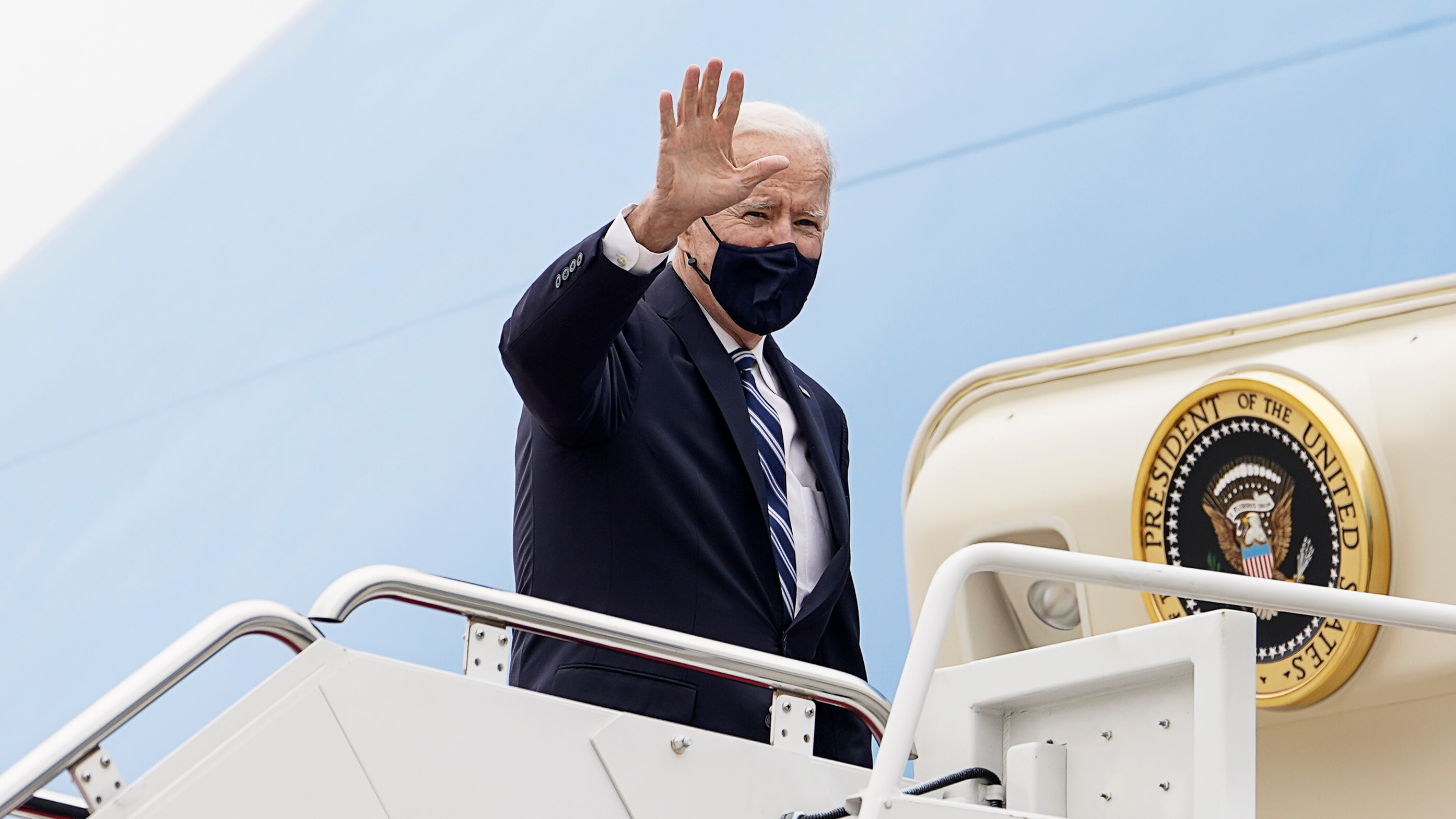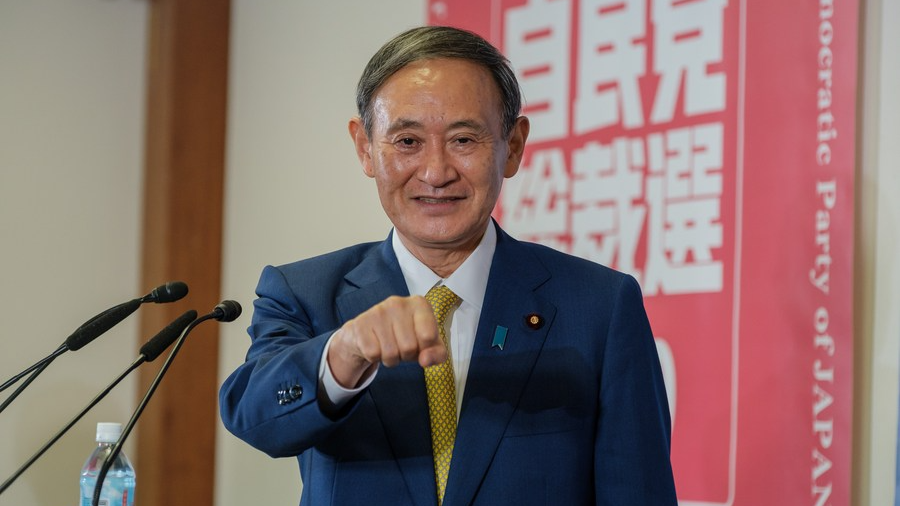
U.S. President Joe Biden boards Air Force One, Joint Base Andrews, Maryland, U.S., March 16, 2021. /Reuters
U.S. President Joe Biden boards Air Force One, Joint Base Andrews, Maryland, U.S., March 16, 2021. /Reuters
Editor's note: Josef Gregory Mahoney is a professor of politics at East China Normal University. The article reflects the author's opinions, and not necessarily the views of CGTN.
Let us set aside the analogous prescience of the Coen Brothers film, Hail, Caesar! (2016), and focus on its most memorable line, "Would that it were so simple," a phrase that befuddles a miscast cowboy star in a film that flirts with imperial flights of fancy and global communist intrigue.
As much as the Coen Brother's cult favorite The Big Lebowski (1998) is an absurd riff on Washington's first war in Iraq, Hail, Caesar! can be viewed as a send-up of the lingering fantasies of hegemony in a post-imperial world, laid out incredibly a year before Trump et al returned to Ronald Reagan and Joseph McCarthy-era language, but in a time when American power could no longer even save itself (note: more than a half million dead from COVID-19 in the U.S. and counting).
Enter Japan and its new Prime Minister Yoshihide Suga. In fact, Suga is not really new. A longtime ruling party stalwart and formerly the right hand of his predecessor, Shinzo Abe – the right-wing conservative, historical negationist and longest-serving prime minister in Japanese history – Suga claimed the top spot late last year, entering power somewhat unexpectedly and in a difficult moment, difficult for Abe due to his recurrence of ulcerative colitis, precipitating his resignation, and difficult for Suga because his popularity, even in the Liberal Democratic Party, was not as firm, and because the pandemic was raging everywhere, but worst in Japan's security guarantor, the United States.
It has been reported that Washington was Suga's first trip abroad, Hail, Caesar!, so to speak, given the somewhat faithful tradition of new Japanese prime ministers visiting the White House first upon taking office. In fact, Suga visited Vietnam and Indonesia in October of last year, a month after taking office. Perhaps he would have preferred the U.S. but infections were already ravaging the White House in late September and Donald Trump himself would be hospitalized with a severe case in early October.
By then, it was clear to sober political analysts that Trump would lose the election and the U.S. would enter a fraught transition. Indeed, the downtown Washington board-ups and fencing around the White House should have been placed around the U.S. Capitol instead, where during their assault on Congress, Trump's supporters sought to tear down democracy in the name of "democracy." Hail, Caesar!
But according to reports, in February, once Joe Biden's election had survived Trump's attempted coup, once the face mask-wearing Biden was securely in the White House, Suga sought a meeting: this was delayed nominally by the U.S. due to COVID-19 concerns but more likely because more pressing crises required Biden's attention.
Which brings us to mid-April. So let's be clear about Japan's difficulties: still stuck in a middle income trap, its biggest trading partner is China, its dependency on the politically unstable U.S. for security, its relations with China at risk, a global pandemic and short-handed vaccines, a wrecked Olympics, controversial Fukushima radioactive releases, and perhaps least significantly but most importantly, a prime minister who wants to shore up his relatively weak political support in his own party by demonstrating a good personal relationship with the new U.S. president but without further alienating Beijing or imperiling Japanese economic interests in a time when neither can be afforded.

Yoshihide Suga, new president of Japan's ruling Liberal Democratic Party, gestures before a press conference in Tokyo, Japan, September 14, 2020. /Xinhua
Yoshihide Suga, new president of Japan's ruling Liberal Democratic Party, gestures before a press conference in Tokyo, Japan, September 14, 2020. /Xinhua
But what does Caesar want? Despite Suga's pickle, or indeed because of it, what Biden wanted was for Japan to take a stronger, vocal position in support of Taiwan against Beijing, and to take a stronger position against China generally by serving as a committed cornerstone in the American-led Quad.
Before the meeting, opinions were split among Japanese policymakers and pundits regarding the stance Suga should take. Some believed he should go all in with Biden's containment strategy.
Others said Japan had already done enough. Given pressures Suga felt at home and abroad, which might be placated in part by demonstrating a good relationship with Biden, given the context that previous Japanese prime ministers in similar situations were short-termers if their meeting with the U.S. president went poorly, there was a genuine concern that Suga was incredibly susceptible to appeasing the White House despite his reported reservations. This fear was confirmed in part before the meeting by sell-offs of Japanese stocks with substantial exposure to the Chinese market.
In fact, Japan previously has resisted directly criticizing China on Xinjiang and other matters that are not directly related to its national interests, treading a fine line between upsetting its economic interests and complicating its security. Indeed, this is not unique to its relations with China alone – we can see this in other bilateral ties, most recently with how Tokyo has responded (or not responded) to developments in Myanmar.
While it's clear that Suga, like his predecessor, aims to revise Article 9 of Japan's pacifist constitution to permit the country to develop its military forces, and while this has intersected perversely with the nationalist and historical negationist positions of these politicians, it ought to be clear that Japan is incapable of a truly independent foreign policy as long as it relies on Washington for security.
That said, although both Biden and mainstream Western media have emphasized above all Biden's remarks that the U.S. and Japan have an unshakable alliance and will stand together against China, would that it were so simple. Caveat lector, a close reading of what Suga actually said shows a much softer position than the White House sought, and softer than Biden's characterization. In fact, what Suga actually called for was little more than peacefully maintaining the status quo, which is literally nothing new.
Nevertheless, while Suga clearly wanted to avoid offending Beijing as much as possible, his truest concession came when he stated succinctly, "The United States is Japan's best friend." As we all know, best friends aren't necessarily good friends, they're simply the best you have. And in times like these, with all the necessary caveats and equivocations, Hail, Caesar!
(If you want to contribute and have specific expertise, please contact us at opinions@cgtn.com.)

